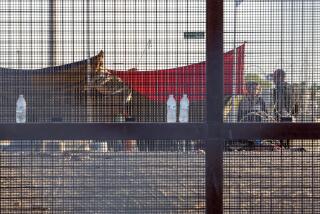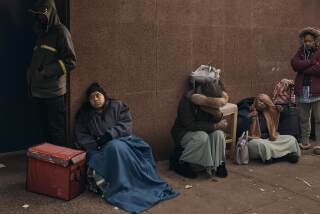New rulings amid coronavirus could force Trump to release migrant children and parents

WASHINGTON — A federal judge in Los Angeles has given the Trump administration until April 6 to deliver an account of why it can’t quickly release many of the roughly 7,000 immigrant children at risk of contracting the coronavirus in shelters and detention facilities across the U.S., and unite them with waiting sponsors.
On Monday, a federal judge in Washington, D.C., expanded the ruling to apply to their detained parents as well.
The Justice Department declined to comment Monday on whether the administration planned to appeal in either case, both of which also mandate oversight of the detention facilities’ preparedness for the pandemic. The White House did not respond.
While praising the rulings, Karen Tumlin, a Los Angeles-based lawyer and director and founder of the Justice Action Center, said the administration was forcing “ad hoc justice” amid the coronavirus outbreak.
“If you’re lucky enough to have a lawyer, to get a judge to do a telephonic hearing, then we’re getting common-sense results in favor of release — during a pandemic,” said Tumlin, who represented three children who’d been in Office of Refugee Resettlement custody for nearly a year and were released to their father just before the administration announced it would suspend many family reunifications, including in California.
Judge Dolly M. Gee of the U.S. District Court in Los Angeles noted in her decision late Saturday that while children appeared less susceptible to COVID-19 than adults, in detention they were more vulnerable — not just to the virus, but to trauma.
“The severity of the harm to which plaintiffs are exposed and the public’s interest in preventing outbreaks of COVID-19 among families and children in ICE or ORR custody that will infect ICE and ORR staff, spread to others in geographic proximity, and likely overwhelm local healthcare systems, tips the balance of equities sharply in plaintiffs’ favor,” Gee wrote.
The Office of Refugee Resettlement at the Health and Human Services Department is responsible for the roughly 3,600 unaccompanied migrant children in shelters across the U.S., and Immigration and Customs Enforcement, an agency under the Homeland Security Department, is charged with some 3,300 children detained with their parents at three family detention centers.
ORR has confirmed four cases of coronavirus among minors in its custody so far of 18 tested, and ICE as of March 27 had put at least one child under quarantine while awaiting results, according to ORR. Eight ORR personnel or foster parents in five programs in New York, Washington and Texas have also “self-reported” testing positive for COVID-19.
ICE has confirmed four cases among detainees, all in New Jersey; five cases among employees or personnel working in its detention centers; and 28 other employees, as of Monday.
Both HHS and ICE said they’re reviewing the relevant orders. ICE spokeswoman Lori Haley said the agency could not comment on pending litigation, while Health and Human Services spokesman Mark Weber said the ORR would “respond to the court.”
Gregory Copeland, the legal director of Rapid Defense Network, who filed suit in Washington against the Trump administration on behalf of detained families, said, “I truly hope they will do what’s so clearly in everybody’s best interest here.”
“You’ve had an utterly inept, deficient effort to prepare for this crisis and to mitigate the risk of this spreading in detention,” he said.
The Trump administration is facing a spate of lawsuits across the country calling on the administration to close immigration courts and release migrants from often overcrowded, unsanitary detention facilities that medical experts have said are “tinderboxes” for the virus. Gee called them “hotbeds for contagion” that pose “unprecedented threats” of “irreparable harm” amid the pandemic.
Several judges have ordered the government to free migrants, though those decisions have so far mostly applied to adults. The Justice Department has closed some immigration courts, but reopened others.
Pastor Fred Morris, who runs the San Fernando Valley Refugee Children Center, predicted that because of the government’s insistence on keeping migrants in federal custody, “a good bunch of them will die.”
“It’s not just indifference and incompetence,” Morris said. “It just cruel to keep them there.”
Gee did not order the immediate release of thousands of minors who fall under a 1997 consent decree broadly known as the Flores settlement, saying that “rushing to release minors en masse” amid current coronavirus travel restrictions or potentially to unfit sponsors wouldn’t be advisable.
But, she said, ORR and ICE must show “why they should not be held to answer for unexplained delays” in releasing migrant children, in apparent violation of the Flores settlement. Judge James E. Boasberg in Washington on Monday extended that requirement to their parents as well, leaving the Trump administration a week to gather its account.
Gee and Boasberg also ordered that ORR and ICE facilities must ready for inspection, videotape living conditions at any facility chosen for review, and provide a report as to whether they’re at capacity and in compliance with Centers for Disease Control and Prevention guidance.
Copeland’s clients have described facilities where only one sign — in English — gave basic sanitation instructions for how to prevent contagion, others where no hand sanitizer or even soap was provided, and no protections such as masks or gloves for either guards or detainees forced to clean the facilities.
This month, ORR paused reunifications of unaccompanied migrant children with family members or other sponsors in California and Washington state, followed by New York, citing a high number of coronavirus cases. But immigration lawyers told The Times that releases of children across the country have effectively ground to a halt.
As of March 13, according to Gee’s ruling, roughly one-third of children in ORR custody were in group settings and had been detained for 30 days or more. The Flores settlement established a 20-day limit on detaining migrant children and established safety and sanitation standards for their care.
The administration has pushed back against the criticism that continuing to hold migrants, including children and families, in detention facilities risks worsening the spread of coronavirus in the United States, now the global epicenter of the pandemic.
Officials say they are following guidelines from the Centers for Disease Control and other experts to protect detained migrants and the American public, though the agency’s guidelines for the broader population include recommendations directly at odds with immigration enforcement, such as social distancing, or limiting air travel.
The former acting director of U.S. Immigration and Customs Enforcement, Thomas Homan, argued in a Fox News op-ed Sunday that detained migrants “will be far less likely to be infected and become critically ill ... than they would be if they were released.”
Copeland said the argument is refuted by the government’s own actions so far for non-immigrants.
“What did we do with college students? We sent them home,” he said. “Cruise ships — do we keep them on there forever? No, we take them off.”
According to Gee’s ruling, attorneys working at the detention facilities have observed that children, family and staff “continue to spend the vast majority of their time in close physical proximity,” as well as a lack of information about COVID-19 or access to sanitation or medical care. Detained minors and family members, the ruling says, “indicate that large proportions of them ... already show symptoms associated with COVID-19.”
But Gee also pointed out that Homeland Security’s practices to control the spread of the virus, such as quarantining or isolating detained adults, could “exacerbate existing mental health concerns” among detained children.
Critics say the Trump administration is using coronavirus as a front for pursuing authority it has long sought to effectively detain migrants — including children and families — indefinitely. As recently as September, Gee rejected the administration’s attempt to hold children and their parents in detention indefinitely by issuing new regulations.
Trump’s policies have targeted migrant children, who under long-standing federal law generally cannot be quickly removed, and sought to dismantle the Flores settlement, which is designed to safeguard them once in U.S. custody.
The administration is citing CDC guidance to also push back to Mexico or quickly return home unaccompanied minors, regardless of nationality or whether the child is seeking protection in the United States, with rare exception, according to a description of the new policy provided by Customs and Border Protection spokeswoman Cecilia Barreda. Immigration experts and advocates say the move violates federal law.
Tumlin, the California lawyer, said she has to explain to her own children every day what is being learned about the pandemic, “and how to not be terrified.”
“For kids that don’t have that because they’re in custody, but they have willing parents or other relatives to take care of them,” she said, “it’s really tragic.”
More to Read
Get the L.A. Times Politics newsletter
Deeply reported insights into legislation, politics and policy from Sacramento, Washington and beyond. In your inbox three times per week.
You may occasionally receive promotional content from the Los Angeles Times.












